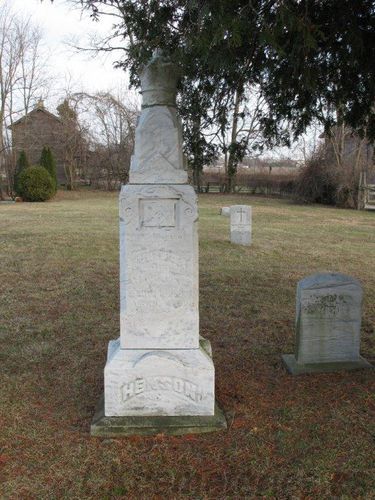This site was founded by the late John Skakel. Contact us HERE
Cemeteries Office Staff have asked that users NOT contact them with questions directly.

The Josiah Henson Monument
Henson writes (Quote) It was the 28th of October, 1830, in the morning, when my feet first touched the Canada shore. I threw myself on the ground, rolled in the sand, seized handfuls of it and kissed them, and danced around, till, in the eyes of several who were present, I passed for a madman. "He's some crazy fellow," said a Colonel Warren, who happened to be there. "Oh no, master! don't you know? I'm free!" He burst into a shout of laughter. "Well, I never knew freedom make a man roll in the sand in such a fashion." Still I could not control myself. I hugged and kissed my wife and children, and, until the first exuberant burst of feeling was over, went on as before. (End of Quote) That in Henson's own words was what happened the moment that his feet first touched the ground in Canada and he had gained freedom for his wife and his family. In fact two times after that he returned to the US helping some slaves escape back to Canada.
The Monument to Josiah Henson is located in the cemetery right next to where "Uncle Tom's Cabin" is located today. The crown on top of the stone was to indicate that he had at one time had an audience with the Queen. A slave for 42 years Henson saw his father beaten badly and he had been sold in his youth. His slave master was not a kind man. Yet, one time Henson had a chance to lead all of his fellow slaves on that farm to escape, and he instead convinced the others to join him to stay a slave as he felt that was the right thing to do.
He had arrived in Dresden with pretty much nothing to his name. However, before long he became a land owner, owning in fact a number of tracts of land in the Dresden area during his life time there. He had originally purchased 80 hectares for himself, though he gave half of that to the Institution at it's beginning. He was one of the original founders of the British American Institute. He was a Board Member of the BAI, a farmer, and a minister. His funeral was apparently one of the largest in Dresden if not THE largest ever held. In 1834 he had set out on foot from his past land holdings on a gov't owned farm in the Niagara area to find a spot for he and his friends to come to live. He had decided that they should come to Dawn. However, it was 1842 before they arrived.
Many people say that the greatest movie ever made by Disney was "Song of the South", and it was almost named after Uncle Tom's Cabin as named in the novel by Harriet Beecher Stowe. It is thought that a long conversation one day with Henson was her inspiration for writing that novel. It only follows that Josiah's life quite likely had been some of the inspiration behind the character "Uncle Remus" in the movie. (The movie is not available at the moment) Talking of his connection with "Uncle Tom" Henson wrote ... (Quote) "From that time to the present, I have been called "Uncle Tom," and I feel proud of the title. If my humble words in any way inspired that gifted lady to write such a plaintive story that the whole community has been touched with pity for the sufferings of the poor slave, I have not lived in vain; for I believe that her book was the beginning of the glorious end. "
Henson had wanted to form a school in Dresden. He writes, "I urged the appropriation of the money to the establishment of a manual-labour school, at which our children could gain those elements of knowledge which are usually taught in a grammar-school. I urged that the boys should be taught, in addition, the practice of some mechanical art, and the girls should be instructed in those domestic arts which are the proper occupation and ornament of their sex." (End of Quote.) Gradually that school came to be, and was known as the British American Institute. The lands the Institute owned were very fertile and rich in black walnut. That walnut helped to pay the bills of the school, and Henson even attended the World's Fair in London where he displayed 4 beautiful walnut boards to show the quality of their wood. The Institution had their own sawmill.
Speaking of Slavery, Henson wrote the following. (Quote) "It is a mistaken idea that the majority of the slaveholders would have sold their slaves if the government had offered to buy them. They liked the system, had grown up with it, and were not disposed to part with it without a struggle. Anti-slavery ideas were not popular at the South, nor generally at the North." (End of Quote.)
Josiah's wife died in 1842. One of his sons was in the US and contacted him often. However, during the Civil War time his contacts ceased so He figured that his son died in that war.